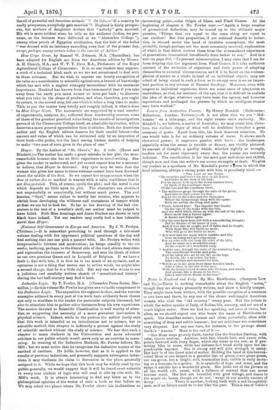Leaves from Australian Forests. By Henry Kendall. (Melbourne : Robertson.
London : Trlibner.)—It is not often that we see " Mel- bourne " on a title-page, and the sight rouses one's curiosity. Mr. Kendall is, we believe, a native of Australia; we may count him, there- fore, the earliest singer of what will be doubtless hereafter a great company of poets. Apart from this, his book deserves attention. No one would take it for an ordinary volume of verse. It shows much rhetorical power ; it expresses passion with force the landscapes, especially when the scene is terrible or dreary, are vividly pictured. In amount of thought, a quality which, whether rightly or wrongly, readers ask fur more rigorously every day, the poems are certainly deficient. The versification is for the most part melodious and skilful, though now and then the writer's ear seems strangely at fault. We give our readers as a specimen of Mr. Kendall's power a iReem in which the local colouring, always a strong point with him, is peculiarly vivid :— "THE LAST 05 MS TRIBE.
"lie crouches and buries his face on his knees,
And hides in the dark of his hair ; For he cannot look up to the storm-smitten trees, Or think of the loneliness there : Of the loss and the loneliness there.
"The wallaroos grope through the tufts of the grass, And turn to their covers for fear But he sits in the ashes and lets them pass Where the boomerangs sleep with the spear: With the nullah, the sling, and spear.
" Tiloola, behold hint ! The thunder that breaks On the tops of the rocks with the rain. And the wind which drives up with the salt of the lakes, Have made him a hunter again : A hunter and fisher again.
"For his oyes have been full with a smouldering thought: But he dreams of the hunts of yore, And of foes that he sought, and of fights that he fought, With those who will battle no more: Who will go to the battle no more.
"It is well that the water which tumbles and fills
Goes moaning and moaning along,
For an echo rolls out from the sides of the hills, . And he starts at a wonderful song: At the sounds of a wonderful song.
"And he sees, through the rents of the scattering fogs, The oorrobboree warlike and grim, And the lubm who sat by the fire on the logs, To watch, like a mourner, for him : Like a mother and mourner for him.
"Will he go in his sleep from these desolate lauds, Like a chief, to the rest of his race, With the honey-voiced woman who beckons, and Mande, And gleams like a dream In his face Like a marvellous dream in his face?"


































 Previous page
Previous page